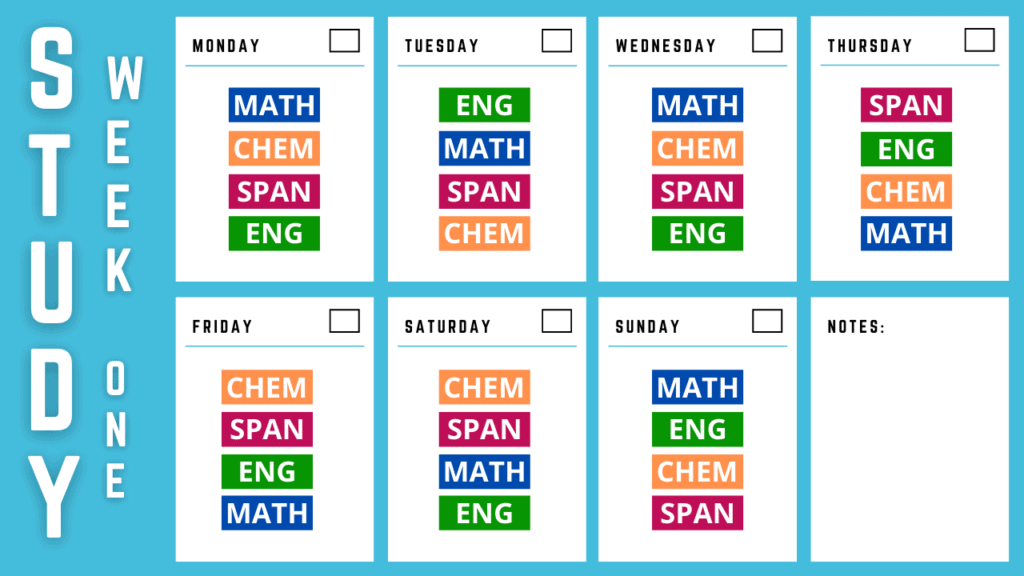By Katie Azevedo, M.Ed.
Knowing how to study for multiple exams at once is the key to maintaining your sanity when school gets hectic. At every point in your school career there are going to be times when you have to study for multiple tests at the same time. Typically these moments happen seasonally, like in the season of midterms and finals.
These periods can be stressful, but there are strategies to help get you through the season of studying for multiple tests. And no, not a single one of these tips involves pulling an all-nighter.
How to study for multiple exams at once
1. Plan your study schedule in advance.
There is no way around this one.. When you have multiple tests in one week, you absolutely have to be diligent about planning. For general academic purposes, a good rule of thumb is to begin studying at least 3 weeks out from your target date. (You would need less time if you’re on the younger side, and obviously far more time if you’re studying for large assessments like AP exams or professional licensure tests.)
If you swear you don’t have enough time to study, you need to read this.
How to plan your study sessions:
- Look at an actual calendar, and identify at least three weeks out from your target date.
- Mark out a study session for each of your subjects for each day leading up to your testing week. (I really do mean every single day. I’ll explain more about this later.)
- The amount of study sessions you have each day should align with the number of tests you have. If you have four exams, plan to have four separate study sessions on each day leading up to the test.
- Each study session should be around 30-45 minutes. This isn’t that much in the scope of all of life. Remember, it’s a temporary season. It’s better to have many short, intense sessions than a few long, unfocused ones.
- If you’re planning your study sessions back to back, then schedule breaks between them. Consider using the Pomodoro Technique.
- You should physically write these study sessions in a calendar (or use a digital one). Do not plan them on the fly. Plan it, write it, make it happen.
2. Organize and process your materials for studying.
Do not skip this step. It’s critical. You cannot study all your materials, and neither should you. The ultimate goal is to condense all your study materials down into a concentrated package of information, and then you will study that. Do this for each subject.
This part of the study process will take some time to get through. Many of the study sessions you planned in Step 1 will be used for this step.
For example, if you have 30 pages of biology notes you need to study for your final, reduce them into about 5 pages. In order to do this, you need to go through all your notes and distill them down, cutting out anything that is non-essential, redundant, or something you already know.
Again, do not skip this step. This process IS studying. When you go through your materials and process what information to keep or discard, you are thinking about the information. And what is studying? Thinking!
Once you distill all your materials down into a concentrated packet of information, this is what you study.
3. Use spaced repetition and active recall.
You need to study each subject on each day. While this may seem like a lot, you’ve already planned for it in step 1. Also, you can do hard things.
There are two learning theories backed by cognitive science, which are fundamental to learning, retaining and recalling information:
- Spaced repetition
- Active recall
Spaced repetition involves studying something over and over again, with a brief time lapse in between each session. This time lapse (about a day) gives your working memory time to “forget” the information from the day before, so that you are in the position to actively recall the information. Active recall is the process of trying hard to remember newly-learned information; it often involves that frustrated feeling of “Ugh, it’s on the tip of my tongue! I know I know this!” These moments of cognitive strain are neurologically essential to the learning process. It’s how you move information from your working memory into your long term memory.
A bonus study skills strategy is to use interleaved practice – it’s the cherry on top.

4. Cut out non-essentials.
For the duration of your study sessions, cut out everything from your schedule that’s non-essential. Now is not the time to take on an extra shift or plan a surprise party for your friend. If you don’t like this advice, then remember it’s just temporary. You have a goal, which is to pass your exams by preparing properly for them, and you can’t do that if it’s not your one and only priority.
Two things you should absolutely not cut from your schedule are sleep and exercise. Both of these directly affect the biochemicals that are responsible for learning and working memory.
Final notes on studying for multiple exams at once
You can basically reduce these four strategies down to a simple, logical statement: Create and stick to a study schedule where you study each subject for a certain period of time every day.
That, with some common sense about getting enough sleep and exercise, not chugging energy drinks, not pulling all-nighters, and keeping a realistic perspective about a realistic outcome about your ideal grades, should get you through what I know can be a very stressful time.

